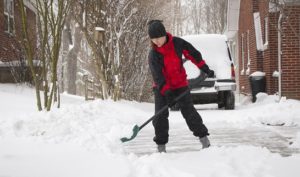 In the second of our posts on preparing for winter we bring information from the Met Office ‘Get ready for winter campaign’ on protecting your property from winter weather and storms
In the second of our posts on preparing for winter we bring information from the Met Office ‘Get ready for winter campaign’ on protecting your property from winter weather and storms
There are a number of tasks you can do to prepare your home, garden, or business from the winter weather. Whether it’s strong winds, heavy rain or extreme cold and snow, there’s something you can do to prepare for winter.
Ensure you’re insured
Sometimes no amount of planning and preparation can prevent the weather damaging your property. Buildings insurance offers peace of mind, so ensure your policy is up to date and covers what you need it to.
Avoid flying garden furniture
When high winds are forecast, remember that some everyday items in the garden can become ‘missiles’. Most winters we see pictures of airborne trampolines and garden furniture.
Check your roof
Before it gets windy it’s also worth checking for loose tiles, slates and flashing and consider removing dead branches from old trees.
Clear your guttering
As leaves start to fall, there’s a risk that wind will blow leaves into your gutters and drainpipes will get filled up. If this builds up, the water will go back into the guttering and leak into the roof and sides of your house.
Trim up
To avoid build-up of leaves in the guttering, the best thing to do is to prune your trees before winter really kicks in. This can also help with avoiding snow building up on the trees, which with it brings the risk of damage from broken branches.
Problems with pipes:
If you have a frozen pipe
If you spot that one of your pipes might be frozen, turn off your inside stop tap. It might be under the kitchen sink, in an airing cupboard or under floorboards near the front door.
It’s best to thaw out pipes slowly, by using a hairdryer on its lowest setting, hot water bottles or towels soaked in warm water. Do not use direct heat as this may cause permanent damage to the pipes and could also lead to a fire in the home.
Turn on nearby cold taps (keep the stop tap turned off) this will relieve pressure on the frozen pipe.
If you have a burst pipe
Sometimes pipes freezing and thawing can cause them to burst. If this happens, turn off the mains water supply immediately by using stopcock. This will stop any more water getting into the water pipes. If the burst pipe is on the main water system the rush of water will stop after a short while.
If the rush of water does not stop or there is still a constant run of water, the problem is probably on the cold water storage system. You will need to drain down the cold water storage tank which is usually located in the roof space.
If you need help to get your plumbing prepared for winter, or have a frozen or burst pipe, you can find a skilled plumber near you through the national accreditation scheme WaterSafe, which is backed by all the water companies in the UK and the Government’s water quality watchdog. Visit the WaterSafe website to find a plumber or winter advice or call 0333 207 9030.
Important things to do before you go on holiday in the winter
(From the Association of British Insurers and Neighbourhood Watch)
If you are planning to leave your property empty for a period of time over the winter, it is a good idea to do the following:
- Leave your heating on for at least an hour a day while you are away from home
- In severe weather, or if severe weather is forecast, you should leave your heating on day and night at your usual temperature setting
- If you’re going to be away for a while, consider turning off your inside stop tap and draining the system so there is no water in the pipes to freeze.
- If high winds are forecast, make sure objects such as garden furniture or ladders are fully secured
- In severe weather, consider asking a friend or relative to visit your home every day while you are away. This will mean that, if you do suffer a burst pipe, it will be detected as soon as possible. Make sure that they know where the stop tap or stopcock is located.

